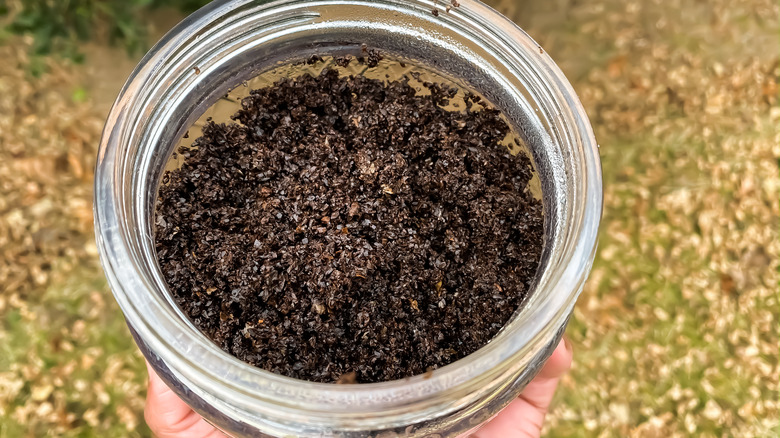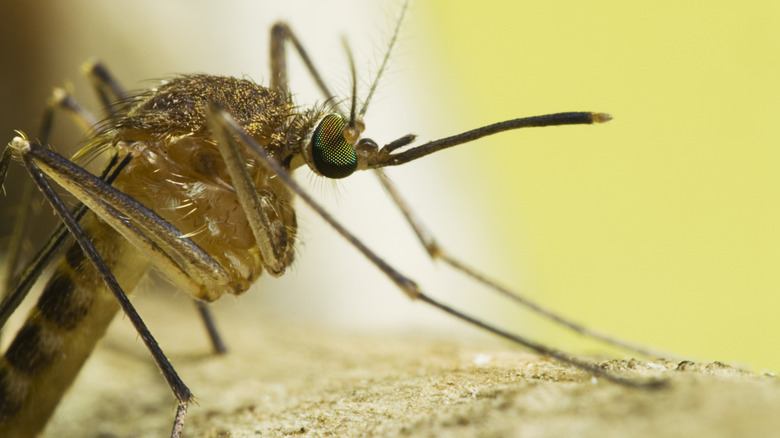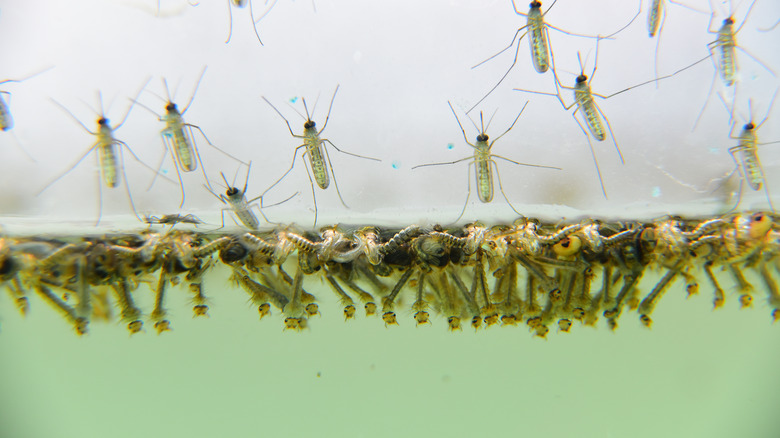People Are Dumping Coffee In Puddles To Repel Mosquitos, But Does It Actually Work?
You may have heard that coffee can be used as a natural insect repellent and an effective alternative to chemical-laden commercial insecticides. The web is filled with such claims, many of which come from reputable pest control firms. But is it actually worth dumping coffee into puddles and other areas with standing water around your home? After all, coffee is not cheap. But more importantly, does it make sense to rely on controversial claims when protecting yourself and your family from mosquito-borne illnesses, such as Zika, dengue, chikungunya, and the West Nile virus?
Here's what science says. While there's no known study out there demonstrating coffee grounds' efficacy in driving mosquitoes away from a typical yard, it still has some benefits for mosquito control. Caffeine is made up of certain chemical compounds with proven insecticidal properties. Rsearch has shown that female mosquitoes are somewhat discouraged from laying eggs in water infused with fresh and used coffee grounds. There's even evidence that discarded grounds can kill mosquito larvae when added to their habitat. Understanding the results of these findings can help you decide whether it's worth trying coffee as an insecticide in your home.
How coffee affects mosquitoes
Caffeine earns coffee its distinction as one of humanity's most treasured stimulants. But it's also a type of methylxanthine, a naturally occurring compound that's known to harm insects by inhibiting their phosphodiesterase activity. By inhibiting this activity, caffeine disrupts the insects' cyclic adenosine monophosphate (cAMP) levels. cAMPs are molecules that help regulate a number of biological processes, including metabolism, gene regulation, and immune functions in living organisms. A disturbance in cAMP levels impacts these functions, and that's the quality that makes caffeine a potent natural insecticide.
Several studies show the repellent and insecticidal impact of coffee on both adult mosquitoes and their eggs. A study published in Parasites & Vectors (via the National Library of Medicine) found that nine out of ten times, female mosquitoes will lay their eggs in clear water as opposed to water containing highly concentrated coffee extract (HCE). For the purposes of the study, HCE comprised 4.7 grams of roasted, ground coffee in 150 mL of boiling water. When it comes to used coffee grounds, a mixture made up of 4.7 grams of used coffee grounds in 75 mL of hot water decreased mosquito egg hatching by about 30%. While brewing a coffee mix akin to the HCE mixture in the study is not economical, disrupting egg hatching with used grounds seems to be a viable strategy, despite the lower effectiveness rate.
Used coffee grounds in standing water can kill mosquito larvae
The study from Parasites & Vectors showed that used coffee grounds can prevent mosquito eggs from hatching. Another experiment performed in New Zealand found that used coffee grounds can actually kill mosquito larvae in standing water. In the experiment, researchers added varying amounts of used coffee grounds to water with larvae to gauge the insecticidal effect of different concentrations. The results showed that more larvae died in water containing used coffee grounds than in clear water, regardless of coffee concentrations. With time, water with the most coffee grounds stayed lethal to larvae, whereas solutions with lower doses caused less mortality. A possible interpretation of this study is that the higher the coffee content, the longer the insecticidal solution stays effective. This conclusion aligns with simple logic, too.
Now, should you start dumping coffee grounds in your outdoor water features? If you're thinking about brewing highly concentrated coffee for this purpose, we'd advise against it. It'll be expensive, and the conditions in your yard won't mirror those of the researchers' labs. Without the right conditions, there's no guarantee that you'll get the same result. That said, if you're not sure what to do with your leftover coffee grounds every morning, try adding them to sources of water outdoors. You may be able to prevent some larvae from hatching. But if you want a proven way to eliminate the annoying pests, getting rid of stagnant water may be the more effective step.


